| log #149: next code:
crossing My experiences say: We don't have a
„clash of civilisations“, we have a “clash of narratives“.
Ther is a question: What makes any arbitrary Austrian more my ally than any turkish,
serbian or what else person?
| Same place of birth? Same language? No sir!
After all the years being an Austrian I can testify that: It's a matter of other factors.
In 2006, when I did the first steps for "next code" as part of
"exociti", Deniz Gül disseminated a simple but important question. |
 |
She has put it on stickers in the streets.
Her "pardon me, who are you?" did not pretend, it were a clear-cut
thing, who someone is being your compatriot.
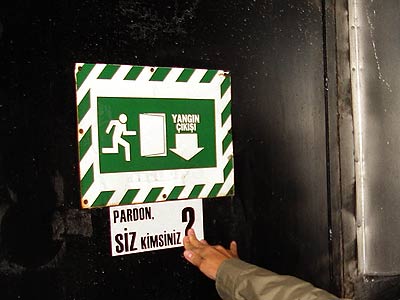
In Austria we don't ask, we pretend to know. Different
groups are running campaigns, telling us, that turkish people will conquer the occident (=
"Abendland"). I hear and read the same arguments we know over decades,
centuries.
In fact that topic is well known, since Habsburg-guys did
their propaganda while running the counter-reformation [wiki] in the
16th century. Also Martin Luther, main reason of the counter-reformation, dealed
with that topic: "He saw the Turks as a scourge sent to punish Christians by God,
as agents of the biblical apocalypse ..." [wiki].
They still don't tell us, that in times of feudal system
WAR was business as usual for aristocracy, cause land and villeins, bond-slaves were the
base of their wellfare. If you take the "war theme" out of the story for a
moment, you can see, what it also was about, if you look at the area between
Vienna, Beograd and Istanbul.
Cut!
Signs and symbols alongside the imaginary route between the
"Porte" ("Hohe Pforte", "Bab-i Ali" [Wiki]) in Istanbul and the
"Schoenbrunn Palace" [Wiki] in Vienna, crossing the "Kalemegdan" [Wiki] in Beograd.
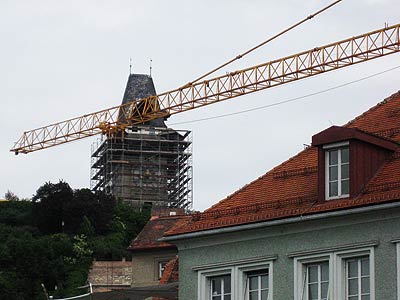
I told about "The Clocktower" (last note), importand landmark downtown Graz, the
capital of Styria. It stands on a hill, where once a fortress was sited, Napoleon could
not seize. So this is a symbol in many ways.
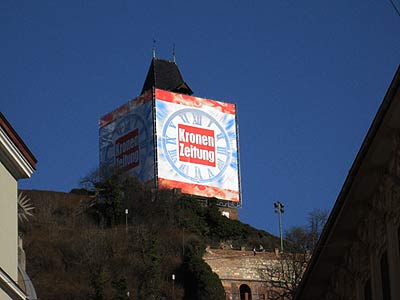
This year, in days of restoration, the clocktower was
occupied as a display for a yellow press-paper ("Kronen Zeitung"), famous fot it's long term-campaign against
Turkey and muslims.
| In the year 2003 artist Markus Wilfling made
this landmark part of a work named "Schattenobjekt Uhrturm" ("Shadow-Object
Clocktower") [link] Foto by Christian Bauer (GNU). By the way, Wilfling was contributor of "next code: exit": [link] the second part of this
trilogy. So there are some inputs and metaphors related to the circumstances of being different
| being equal on that area.
The city of Graz, capital of Styria, is pivot in a way,
crucial point in another way for a dweller of the "province". How about that in
other countries? Turkey is that big ... fragmented? Or is this all like in older days,
when there were no coherent "national" territories? |
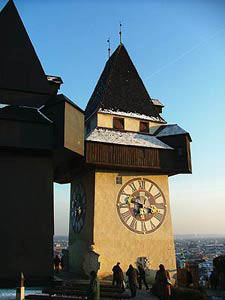 |
There was no mapping possible, no exact
borders could be drawn. There were no techniques for exact cartography before the middle
of the 18th century. (Cassini etc. [Wiki])
In those days special places and the lines of travelling/communication in between were
more important than nations with elaborated borders. Has really something changed? Is
decreasing that importance just ideology or something else?
Cut!
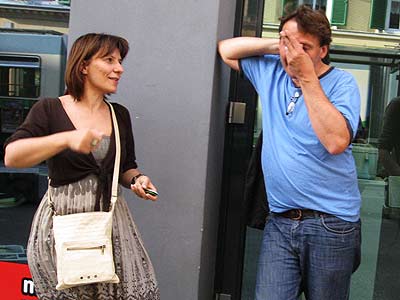
See the notes of curator Mirjana Selakov on
this project: [note #1] [note #2] [note #2]
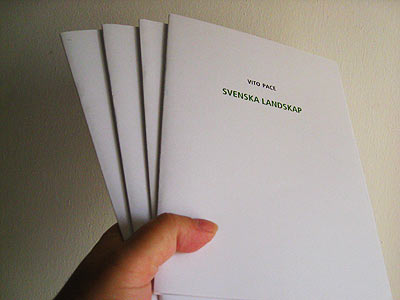
A first step on our way to the festival-focus was the
installation "svenska landskap" [link] by the italian artist Vito Pace, shown at the
"einraum" in Gleisdorf. Now the catalogue is available: [link]
[next code: crossing]
core | reset | home
25•09 |